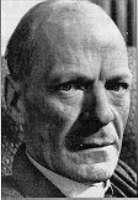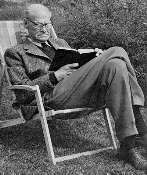Philosophy Pages
| Dictionary | Study Guide | Logic | F A Q s | ||
|---|---|---|---|---|---|---|
| History | Timeline | Philosophers | Locke | |||
Philosophy Pages
| Dictionary | Study Guide | Logic | F A Q s | ||
|---|---|---|---|---|---|---|
| History | Timeline | Philosophers | Locke | |||

|
Life and Works . . Methods . . Concept of Mind Bibliography Internet Sources |
As Waynflete Professor of metaphysical philosophy at Oxford and as editor of the journal Mind for nearly twenty-five years, Gilbert Ryle had an enormous influence on the development of twentieth-century
analytic philosophy.
In "Systematically Misleading Expressions" (1932) Ryle proposed a philosophical method of dissolving problems by correctly analyzing the derivation of inappropriate abstract inferences from
ordinary uses of language.
Applying this method more generally in "Categories" (1938), Ryle showed how the misapplication of an ordinary term can result in a category mistake by which philosophers may be seriously misled.

Dealing with the traditional mind-body problem in The Concept of Mind (1949), Ryle sharply criticized Cartesian dualism, arguing that adequate descriptions of human behavior need never refer to anything but the operations of human bodies. This form of logical behaviorism became a standard view among ordinary-language philosophers for several decades. Ryle's Dilemmas (1954) and Collected Papers (1971) cover a wide range of topics in philosophical logic and the history of philosophy.
|
Recommended Reading:
Primary sources:
Secondary sources:
Additional on-line information about Ryle includes:
|
